6 Best Choke for Duck Hunting in 2026: Field Tested (+ Buyers Guide)
With the droughts and the dip in waterfowl numbers, last year’s duck hunting season was a bit underwhelming, but a friend of mine had a particularly bad time. He went out there with a choke that was too powerful for close-range shooting, and ended up doing way too much damage to his quarry. Turns out he wasn’t the only one.
After testing out a lot of chokes, I’ve come up with a list of my favorites specifically for duck hunting. Now, keep in mind, the right choke for you depends on your shotgun, preferred range, ammo type, and other factors. While you’re going through the reviews, remember to go out there and try them out, get some practice in, before making the final call.
Before anything, let’s go over how chokes work.
How Chokes Work
The choke is a metal tube inserted into the barrel of your gun to narrow down the muzzle, so the pellets in your shot fly as effectively as possible. How a choke works is similar to a water hose. Just like how a hose can concentrate water into a single line, a choke compresses and groups your shotgun pellets.
The type of choke you choose provides a different shot pattern (grouping) and shot string (pellet spread). If you want a clean and accurate kill on the first try, go for a choke that gives you a tight shot pattern and a short shot string for the range you’re shooting from. The goal is to land a dense pattern within a 30 inch-diameter ‘kill zone,’ that covers your quarry.
Each choke is specifically designed to give you an edge during your hunt by improving certain specs, such as your shooting range or accuracy, based on the choke you are using.
Let’s take a closer look at the various types of chokes you may come across and how they affect your shots.
Types of Chokes
There are several types of chokes on the market that all perform differently. Chokes have different levels of constriction (or tightness) and certain choke constrictions might be a better fit for you depending on the type of waterfowl you’re hunting, the style of the hunt, and the distance from the target.
Full choke is the narrowest and delivers the tightest patterns, ideal for long-range shooting from more than 40 yards.
Improved modified choke is slightly less narrow than the full choke and works for long-range shooting around 40 yards.
Modified choke is a fraction more open than the improved modified choke, and it’s good for mid-range-shooting from around 35 yards.
Improved cylinder choke is even more open than the modified choke, and it’s better for shooting from a 25 yard distance, because the pattern gets looser at longer distances.
Cylinder, or the open choke, is the default size of the muzzle end with no constriction, and shoots short-ranges less than 20 yards.
Now, one thing to remember is that there are even more types of chokes between these common types, depending on their specific features. Here are some features that can differentiate them and add even more variability to your selection.
Extended/Flush – You can add the extended chokes on to the muzzle without tools and they extend outward once they are screwed in. You’ll need a wrench to insert a flush choke, but it goes fully into the muzzle.
Ported/Non-ported – Ported chokes come with precision drilled holes to reduce the recoil and muzzle jump when you fire it compared to a more traditional ‘non-ported’ choke.
Now, for duck hunting, I recommend going with modified chokes or full chokes; most duck hunts happen at around 40 yards from the fowl and the other chokes just don’t have the range.
How I Chose the Best Choke for Duck Hunting
As someone who has been duck hunting for almost 20 years now, I’ve owned my fair share of chokes and have even been sent some by companies. So when putting together this article, I considered the chokes that served me well in terms of effectiveness, durability, ease of use, and value for money.
But, at the end of the day, I’m just a single person, so I reached out to some of the best duck hunters I know in the industry to get their opinions on the chokes on my list. They also recommended some of their favorites. Thus, I was able to put together a comprehensive list of the best chokes for duck hunting.
Keep in mind that not all chokes are the same, and there’s no universal standard for comparing them. Choke preferences are personal, and different duck species may require different chokes. That’s why I’ve tried to put together a broad selection that has something for everyone. Let’s get right into it.
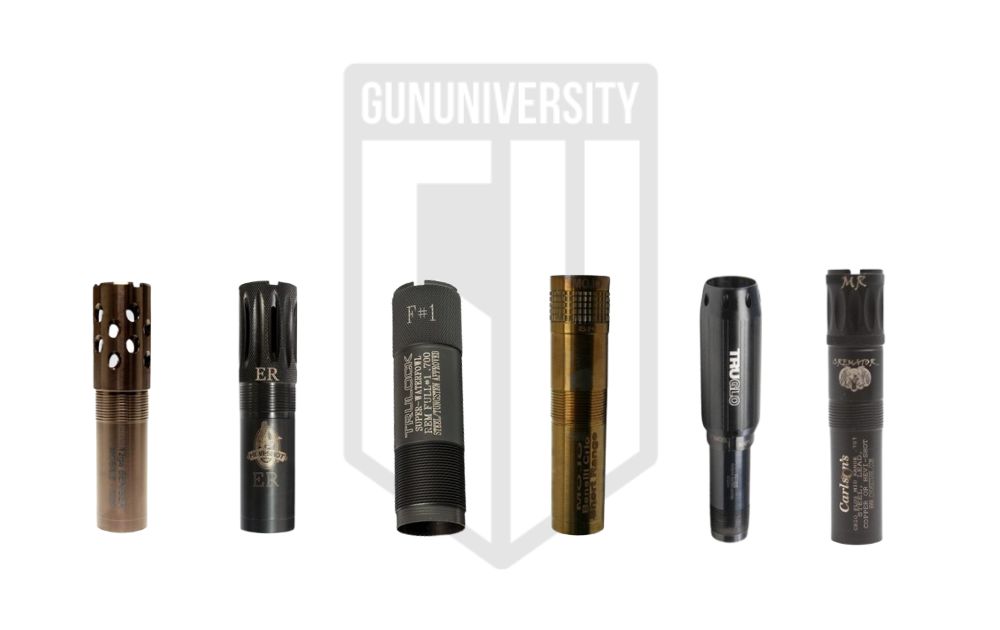
Gun University’s Choices of the Best Choke for Duck Hunting
Best Chokes for Duck Hunting
Best overall Patternmaster Code Black Duck choke | 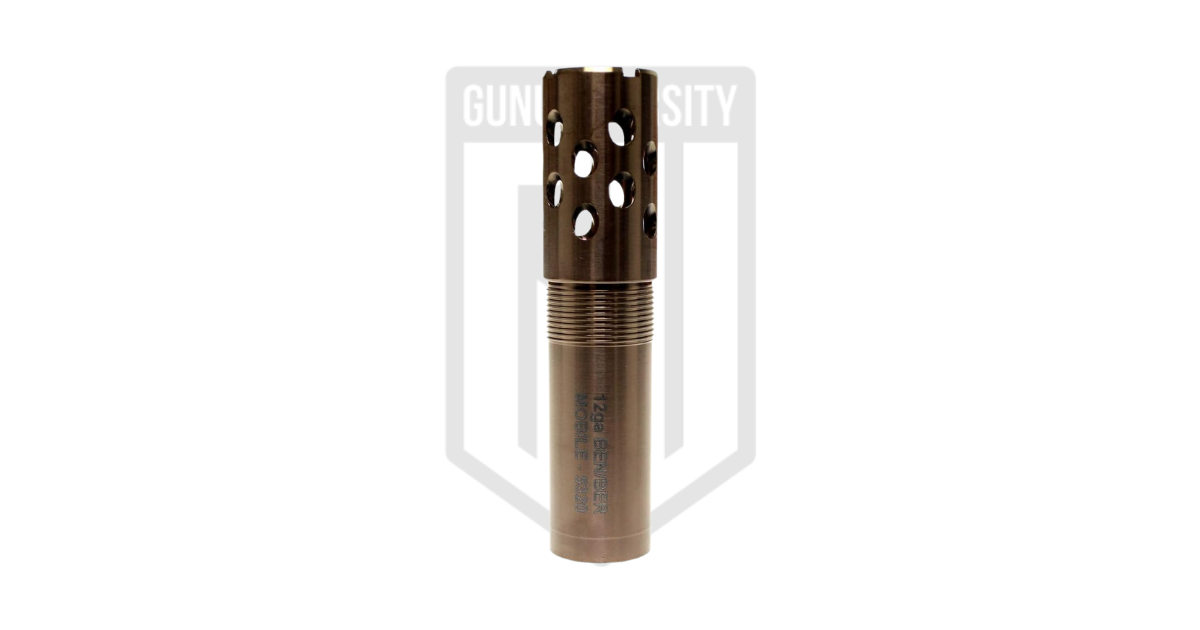 |
| Buy on Amazon |
Best for Consistent Pattern Mojo Outdoors Fatal Shot | 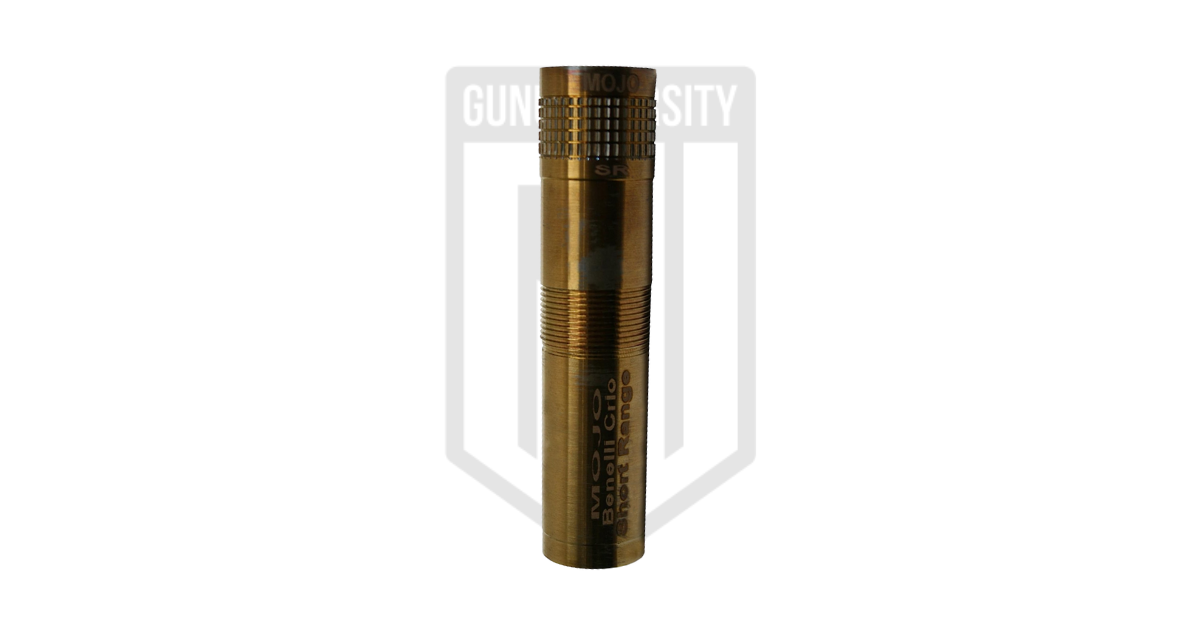 |
| Buy on Amazon |
Best versatile TruGlo Titan Adjustable Choke | 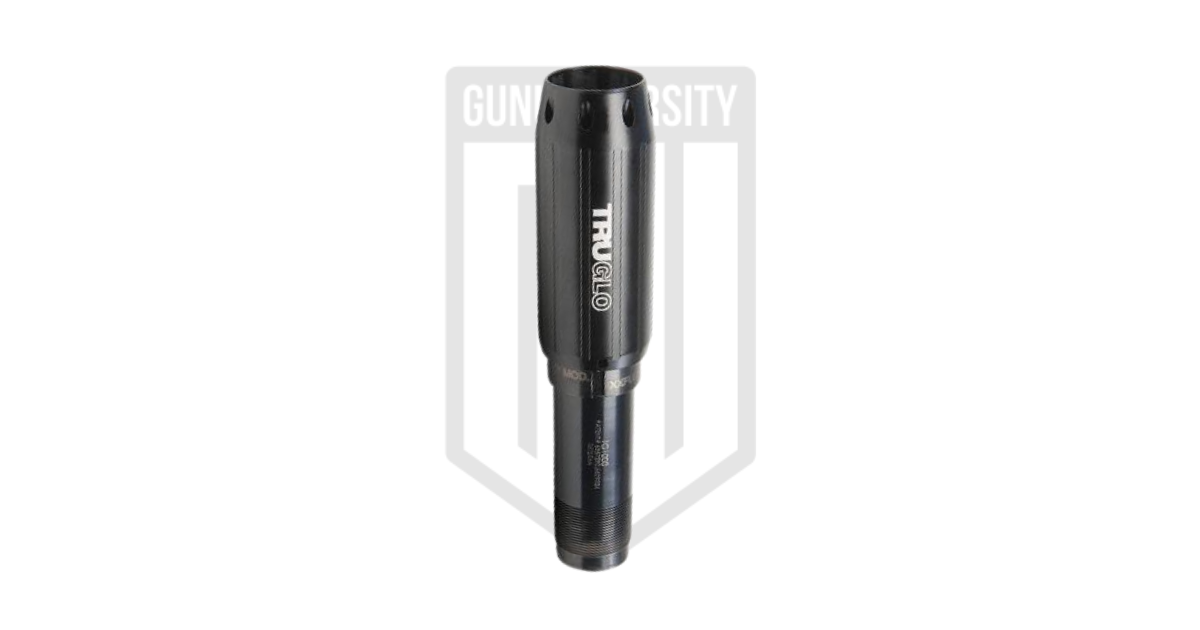 |
| Check Price |
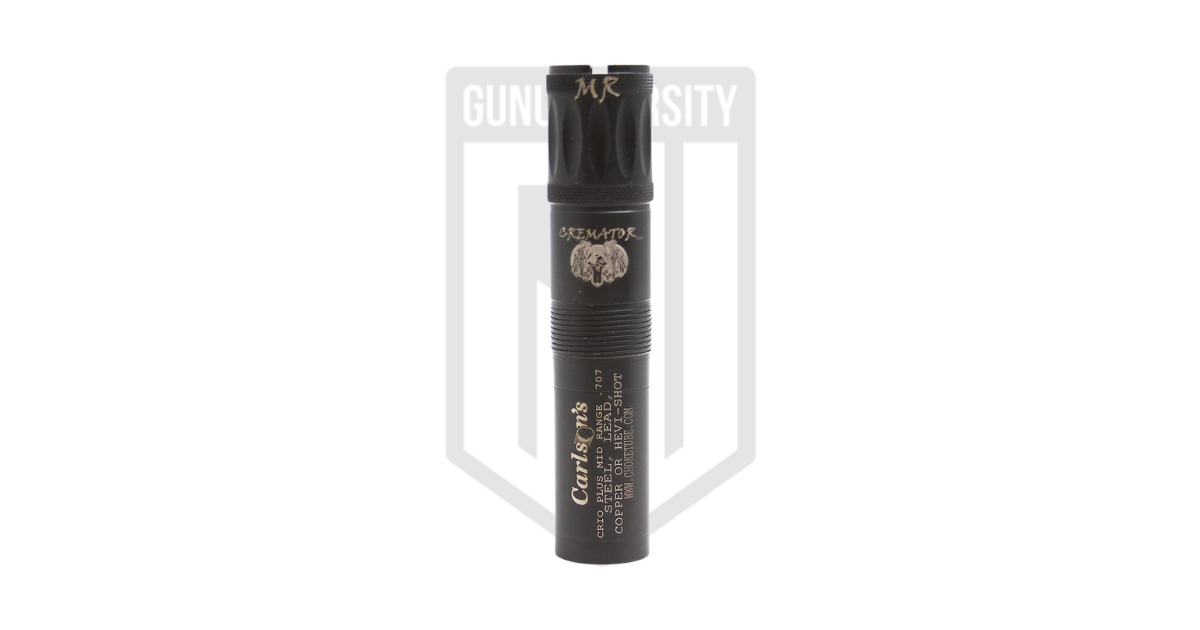 |
| Buy on Amazon | |
Best for long range shooting Trulock Super Waterfowl Choke | 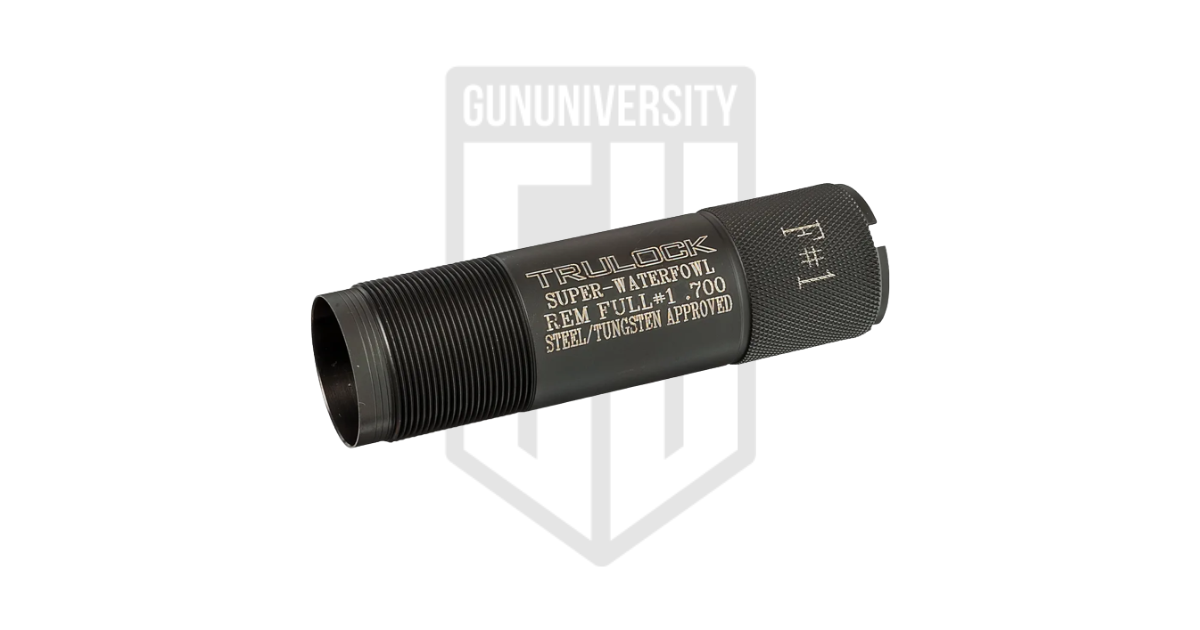 |
| Buy on Amazon |
Best budget Hevi-Shot Extended Range Waterfowl Choke | 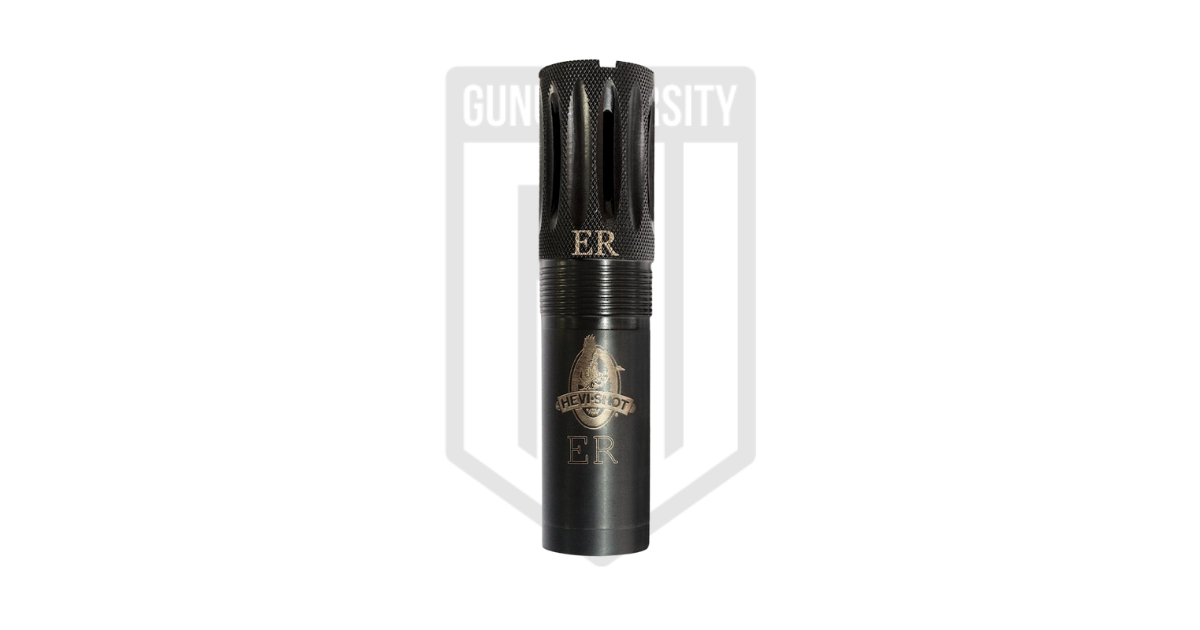 |
| Buy on Amazon |
Best Duck Hunting Choke Spec Comparison
Below is a table of the specifications for each choke. Click the name of the item to jump to that review.
| Choke | Gauge | Material | Length (in) | Extended/Flush |
|---|---|---|---|---|
| Patternmaster Code Black Duck Choke | 12 | Heat-treated Sainless Steel | 8 | Extended |
| Mojo Outdoors Fatal Shot | 12 | Stainless Steel | 9 | Extended |
| TRUGLO Titan Adjustable Choke | 12 | Steel | 8 | Extended |
| Carlson's Cremator Non-ported Waterfowl Winchester - Browning Choke | 12 | Heat-treated stainless steel | 8 | Flush |
| Trulock Super Waterfowl Chokes | 12 | Alloy Steel | 5.5 | Extended |
| Hevi-Shot Extended range Waterfowl Benelli Crio plus Choke tube | 12 | Stainless Steel | 8 | Extended |
Best Chokes for Duck Hunting
Here is our list for the best chokes for hunting ducks
- Patternmaster Code Black Duck Choke
- Mojo Outdoors Fatal Shot Choke
- TruGlo Titan Adjustable Choke
- Carlson’s Cremator Non-Ported Waterfowl Choke
- Trulock Super Waterfowl Chokes
- Hevi-Shot Extended Range Waterfowl Choke
Best Chokes for Duck Hunting – Reviews
Since the right choke for one person may not work for everyone, I’ve ranked the best ones I’ve used in several categories, instead of ranking them in order.
Best Overall Patternmaster Code Black Duck Choke
- Effectiveness A+
- Durability A
- Ease of Use A+
- Value A
Our Grade
A+
Reader’s Grade
A+
Based on 3 Reviews
Your Grade
Do You Own This Accessory? Leave A Review
Success Your Grade Has Been
Added To Our Reader’s Score
We use email to verify the accuracy of our reviews. We promise to never spam you.
Patternmaster Code Black Duck Choke Specs
- Gauge 12
- Material Heat-treated stainless steel
- Recommended Shells Steel, lead or other non-toxic ammunition, 2 ¾” or 3″ or 3 ½” shells
- Extended/Flush Extended
- Length (in) 8
Patternmaster Code Black Duck Choke Review
So when I first bought the Patternmaster Code Black Duck, I was skeptical; it’s an expensive one at $100 and had a pretty loyal fan base of hunters who swore by it. But now that I’ve used it, I really understand the hype; it is a solid choke that works for almost any duck hunt, and while it’s not the best in any singular category, it’s the best overall.
One of the things I love about the Code Black Duck is that it’s an extended choke, so I can screw it in without a wrench. That’s a big plus for me because I like to swap chokes quickly in the field without fumbling around. The extended design also acts as a guard to protect my muzzle from dings and scratches, which is a nice bonus.
What truly sets the Code Black Duck apart is its patterning. At 40 yards, it throws a dense pattern that consistently results in clean kills. That patented stud ring inside the choke? It keeps the shot charge tighter for longer, which means those pellets stay together just a bit longer. That’s exactly what I look for in a choke.
The porting reduces recoil and muzzle jump, which I think is an underrated feature. I’ll take anything that gives me an edge. While it’s pricey at $100, the all-around performance makes it worth every penny in my book.
Patternmaster Code Black Duck Choke Pros and Cons
- High Range
- Uniform Patterns
- High Durability
- Expensive
Best for Consistent Patterns Mojo Outdoors Fatal Shot Choke
- Effectiveness A
- Durability A
- Ease of Use B
- Value A
Our Grade
A-
Reader’s Grade
A+
Based on 1 Reviews
Your Grade
Do You Own This Accessory? Leave A Review
Success Your Grade Has Been
Added To Our Reader’s Score
We use email to verify the accuracy of our reviews. We promise to never spam you.
Mojo Outdoors Fatal Shot Choke Specs
- Gauge 12
- Material Stainless Steel
- Recommended Shells Any
- Extended/Flush Extended
- Length (in) 9
Mojo Outdoors Fatal Shot Choke Review
If consistency is what you care about the most, then my recommendation is to go with the Mojo Outdoors Fatal Shot. Not only does it shoot well with all types of shotshells and ammunition, but it also produces consistently dense patterns every single time.
When I patterned my shotgun with the Mojo Outdoors Fatal Shot, I noticed tight, uniform patterns across 20, 30, and 40 yards. For duck hunting, this is a game-changer because dense patterns lead to cleaner, quicker kills. I’ve tried it with different hunting styles—like pass shooting and decoy shooting—and it’s consistently performed well. Just be mindful if you’re into jump shooting; this choke’s mid to long-range setup could damage birds at closer distances.
What I really like is how it’s like an improved modified choke without needing to change it out often. I dialed in my loads and shells for different ranges and found that it’s easy to swap shotshells without fumbling with the choke. It’s got a knurled grip for quick changes, though the non-ported design does add some recoil.
My only gripe? The shiny gold finish can catch sunlight and give away your position. But at around $70 and with a lifetime guarantee, it’s a small price for reliable performance.
Mojo Outdoors Fatal Shot Choke Pros and Cons
- Easy Maneuverability
- Uniform Shot Patterns
- Quick and Clean Shots
- Color Stands Out
- Recoil takes a while to get used to
Best Versatile TruGlo Titan Adjustable Choke
- Effectiveness A
- Durability A
- Ease of Use A-
- Value A+
Our Grade
A
Reader’s Grade
TBD
Based on 0 Reviews
Your Grade
Do You Own This Accessory? Leave A Review
Success Your Grade Has Been
Added To Our Reader’s Score
We use email to verify the accuracy of our reviews. We promise to never spam you.
TruGlo Titan Adjustable Choke Specs
- Gauge 12
- Material Steel
- Recommended Shells All waterfowl loads, including steel and Hevi-Shot
- Extended/Flush Extended
- Length (in) 8 inches
TruGlo Titan Adjustable Choke Review
TRUGLO Titan Adjustable Choke is my pick for the best versatile choke because of the impressive adaptability it gains from the 8 different choke settings. It shoots ducks at any range you prefer and is a great choice for shooting other waterfowl, birds in flight, and even clay pigeons.
The choke settings on the Titan Adjustable Choke are:
- Cylinder
- Skeet
- Improved Cylinder
- Light Modified
- Modified
- Improved Modified
- Full
- Extra Full
- XX Full
This extended choke design lets me adjust the constriction from the tightest fit to no choke without needing any tools. I’ve felt like I’m getting more than just eight choke settings because I’ve noticed even more patterns and shot strings depending on my shotgun, ammo, and choke combos. That’s why I ranked the Titan Adjustable Choke as the most versatile, even above the Mojo Outdoors Fatal Shot, which is also quite flexible.
I typically use steel shot for ducks, but it handles all kinds of loads well. Just keep in mind a few limitations, like only using the cylinder setting for slugs. My main gripe is the 4-inch extension it adds to the barrel, which threw off my sighting initially. It’s not cheap either, but for me, the versatility it brings justifies the cost if you’re serious about duck hunting.
TruGlo Titan Adjustable Choke Pros and Cons
- Easily adjustable choke constrictions
- Adaptable
- Works with many shotshells
- A bit too long
- Expensive
Best value Carlson’s Cremator Non-Ported Waterfowl Choke
- Effectiveness A
- Durability A
- Ease of Use B
- Value A
Our Grade
A-
Reader’s Grade
A+
Based on 1 Reviews
Your Grade
Do You Own This Accessory? Leave A Review
Success Your Grade Has Been
Added To Our Reader’s Score
We use email to verify the accuracy of our reviews. We promise to never spam you.
Carlson’s Cremator Non-ported Waterfowl Choke Specs
- Gauge 12
- Material Heat-treated stainless steel
- Recommended Shells Steel
- Extended/Flush Flush
- Length (in) 8
Carlson’s Cremator Non-ported Waterfowl Choke Review
The Carlson’s Cremator Non-ported Waterfowl Choke is my pick for the value category because it costs the same as most chokes on the market at $60, but it performs just as well as higher-priced options. Carlson’s is a reputed name for choke tubes and other gun accessories for a good reason; their chokes are consistently high quality and very reliable.
I tested this choke last season and was impressed by its performance. The mid-range model reliably covered the kill zone at 30 yards, and the long-range version reached out to 45 yards. While it didn’t match the pattern density of the Code Black Duck at those ranges, it still delivered a solid kill shot.
The Cremator Waterfowl is a flush choke, so you can install it without tools. However, switching it out requires a wrench, which can be a hassle during a hunt. Carlson’s does offer a set with a custom-built wrench for $100, making it a good deal. Still, if you’re considering it, you might also want to look at extended chokes like the Patternmaster Code Black Duck in the same price range.
The Cremator Waterfowl carries a lifetime warranty though, and this is useful given that wrenching the choke out of the muzzle every time you need to change it could cause some damage. The Cremator Waterfowl’s cons are pretty minor when you consider how well it performs for its price range. This choke is a great option for duck hunters who want to step up their game but don’t want to go all-in on a premium choke just yet, or just for hunters on a budget overall.
Carlson’s Cremator Non-ported Waterfowl Choke Pros and Cons
- Dense patterns
- No size or speed restrictions
- Lifetime warranty
- Difficulty handling
Best for long range shooting Trulock Super Waterfowl Choke
- Effectiveness A
- Durability A-
- Ease of Use A
- Value A-
Our Grade
A
Reader’s Grade
TBD
Based on 0 Reviews
Your Grade
Do You Own This Accessory? Leave A Review
Success Your Grade Has Been
Added To Our Reader’s Score
We use email to verify the accuracy of our reviews. We promise to never spam you.
Trulock Super Waterfowl Chokes Specs
- Gauge 12
- Material Alloy Steel
- Recommended Shells Steel and other environmentally friendly shotshells
- Extended/Flush Extended
- Length (in) 5.5
Trulock Super Waterfowl Chokes Review
Most standard full chokes help shots travel distances, but the Trulock Super Waterfowl Chokes do the job exceptionally well, earning them my pick for the best long range chokes.
Trulock Super Waterfowl Chokes come in 3 degrees of full constrictions, and I tried out the choke with the tightest constriction and shot at 50 and 70 yards. At 50 yards, the shot landed in the kill zone but with a smaller diameter than that of the Patternmaster Code Black Duck. The kill zone was a bit spread out more than my ideal pattern at 70 yards, but I’d say the same shot could take down a duck when wing shooting or pass shooting without any problems.
It’s important to remember that these chokes are built with a lot of punch in mind since the full choke from the Super Waterfowl Chokes generally shoots hard steel and tungsten pellets, which are exceptionally rigid and durable. They definitely made this for shooting at long ranges, and I wouldn’t recommend using it on targets at or below 30 yards or else you’ll end up with a very messy takedown.
With this in mind, it’s a given that the Trulock Super Waterfowl Chokes would not work well for jump shooting or hunting ducks over decoys, as these are both done in close range, usually. The other issue is that these chokes are only available for Remington 12 Gauge, so unless you own one or plan to purchase one, this choke may not work for you.
Trulock Super Waterfowl Chokes Pros and Cons
- High pattern density
- High durability
- Easy removal and installation
- Not recommended for close-range
- Works with only one shotgun
Best budget Hevi-Shot Extended Range Waterfowl Choke
- Effectiveness B+
- Durability A-
- Ease of Use A-
- Value A
Our Grade
A-
Reader’s Grade
TBD
Based on 0 Reviews
Your Grade
Do You Own This Accessory? Leave A Review
Success Your Grade Has Been
Added To Our Reader’s Score
We use email to verify the accuracy of our reviews. We promise to never spam you.
Hevi-Shot Extended Range Waterfowl Choke Specs
- Gauge 12
- Material Stainless Steel
- Recommended Shells Hevi-Shot Waterfowl Ammunition
- Extended/Flush Extended
- Length 8
Hevi-Shot Extended Range Waterfowl Choke Review
The Hevi-Shot Extended Range Waterfowl Choke is the least expensive choke on my list costing around $50, but that’s not the only reason it made the best budget spot. It has both range and ease of use covered as it shoots over 40 yards, which is the ideal distance for duck hunting. It is also easy to install and take off because of the knurled fore-end.
I’ve noticed that while this choke performs well with Hevi-Shot ammo, some friends have reported it can be less accurate with other shells. I haven’t had that issue myself; last season, using copper-plated lead shells, I didn’t have any cripples.
One hiccup I faced was with the first choke I bought for my Benelli Montefeltro—it didn’t fit properly due to incorrect threading. I was a bit disheartened but the replacement worked fine, so I’m chalking it up to a one-off issue.
Overall, the Hevi-Shot Extended Range Waterfowl Choke is easy to handle and delivers dense, consistent patterns. While I usually prioritize versatility, this choke is a solid choice for those seeking a budget-friendly option.
Hevi-Shot Extended Range Waterfowl Choke Pros and Cons
- Extended range
- Quick installation
- Durability
- Isn’t compatible with larger steel pellets
- Not versatile
Choosing a choke is just as personal as your choice of firearm. They need to fit your shotgun, your choice of shells and your style of duck hunting. Here’s a quick guide to walk you through the factors you can consider when looking for a choke.
Best Choke for Duck Hunting – Buyer’s guide
Each of the chokes I’ve recommended above are best suited for a specific purpose, and that’s because they have certain qualities that make them more accurate, more powerful, or better for a certain range. So, let’s look at these qualities and how they affect the performance of your choke, and ultimately, the success of your hunt.
Pattern – Every shotgun shell has pellets, and these pellets get distributed when you fire your shot. The goal is to land as many pellets as possible within a 30-inch diameter on your target. This area is your kill zone, and a dense pattern within it means there’s a high chance of making a clean, ethical kill shot in one go. Take a look at these diagrams to understand what I mean:

Shot string – When your shot leaves the barrel, the pressure pushes out your shotgun shell in the form of a shot string. The longer the shot string is, the more chance there is for the pellets to spread, making it much harder for the shot to reach your target and land a kill. Shot string affects shot pattern, and a shorter shot string will give you a denser, more powerful pattern. Here’s what this might look like:


Your choke of choice delays the wad (the compartment separating the pellets from the gunpowder) by a couple of milliseconds, so the shot is contained for a bit longer after leaving the barrel before the pellets start to spread.
Ranges – Range is the distance at which your choke is the most effective and lands the best, or densest, pattern. A full choke for example, has an effective range of 40 yards and beyond.

Some full chokes can land kill shots even from 70 yards, so if you’re wing shooting or pass shooting, full chokes are your best bet for accurately shooting a moving target.

Given that we mostly shoot ducks at around 40 yards, this range and choke combination is ideal for duck hunting.

Personally, I prefer shooting from mid-range when hunting ducks, but if you plan to hunt with jump shooting, an improved cylinder or cylinder choke would work well for this type of close-range shooting.
Pattern, string, and range are all performance factors that can vary depending on the choke you end up using. Here are a few things to look out for when choosing your choke:
- Constriction – The level of constriction affects your effective range and the ideal fit depends on the style of your hunt. Jump shooters usually stick to the middle-ground with improved chokes, while mid- or long-range wing shooters like myself go for tighter, full chokes.
- Material – There are four main types of shot materials that are commonly loaded in shotshells: lead, steel, tungsten, and bismuth. Each shot type performs better when combined with a choke made to handle a specific material. Remember to compare the types of shotshells you want to use with the compatibility of the chokes you are considering to make sure the choke can handle your shots.
- Length – The length of a choke can change your shot string, but can also change your sightings if they are longer than you might be used to; most chokes are 8-9 inches, and some of this length protrudes from the muzzle. While you can get used to this over a time, a shorter choke might be a better option if you find the length of the choke throws off your sighting too much.
- Color – Chokes with muted colors are less noticeable and can reduce your visibility if you want to remain hidden during your hunt. Brightly colored chokes might not be a big deal if you plan to hunt during daytime. However, certain shades could cause a glint or glare that can make it harder to aim or make you much more visible.
- Price – If you’re a beginner or looking to get into duck hunting, it may be a good idea to try out a more budget-friendly choke to see if you prefer the way your shots change with it. Once you get more comfortable shooting with a choke or want to really fine-tune your shooting, you can look at more premium range options with more features and specializations.
Conclusion
While you can always hunt ducks with a stock shotgun with no choke, taking that extra step really helps take your shooting to the next level with finer control over your range, accuracy, and kill zones. Remember to try out a few based on the ranges you shoot at to find the choke that matches your duck hunting goals and feels the best to shoot. Happy hunting.
Before you go, check out our Best Shotguns By Action Type!
Best Duck Hunting Choke – FAQs
This depends on your shooting range, shot types, and hunting style. Not every choke is going to work well for every hunter, but the Patternmaster Code Black Duck is the best choice for duck hunting. It’s an outstanding performer overall, and it’s easy to handle. If you’re looking for an all-in-one versatile choke, I recommend the TRUGLO Titan Adjustable choke, as it has 8 choke settings to customize for your hunt.
Small shot sizes work well for ducks. You can use No. 3 or No. 4 shot sizes at short-range around 20 yards, and at a longer-range around 40 yards, you can use the slightly larger No. 2 or No. 1 shot sizes.
Everyone has their own preference, but I personally go with a 12 gauge shotgun instead of a 20 gauge when shooting duck. The 12 gauge is better for larger pellets and gives you a better pattern density.
Power and pattern density are crucial factors that hunters consider when selecting their shotgun shells. Whether I’m hunting waterfowl, geese, or other game, my favorite is the Mossy Oak Shadow Grass by Apex Ammunition. I love how versatile these shells are for waterfowl hunting in different habitats, and their steel and tungsten blend delivers serious knockdown power for a sure shot.
If you’re shooting over decoys, you’re probably better off using a light modified or modified shotgun choke. Improved modified chokes are your best bet for pass shooting because they offer better accuracy for moving targets. For smaller shots, full chokes can give you better shot dispersion, but the tighter the choke is, the more you risk over-constriction and damaging your gun.
We should maintain choke tubes with care so as not to let them rust. If you ever get the choke wet, it’s best to take out the tube, dry it, clean the threading, and dab on some grease before fixing it back to the muzzle.
Recent Posts
February 21, 2026
February 21, 2026
February 21, 2026
February 20, 2026

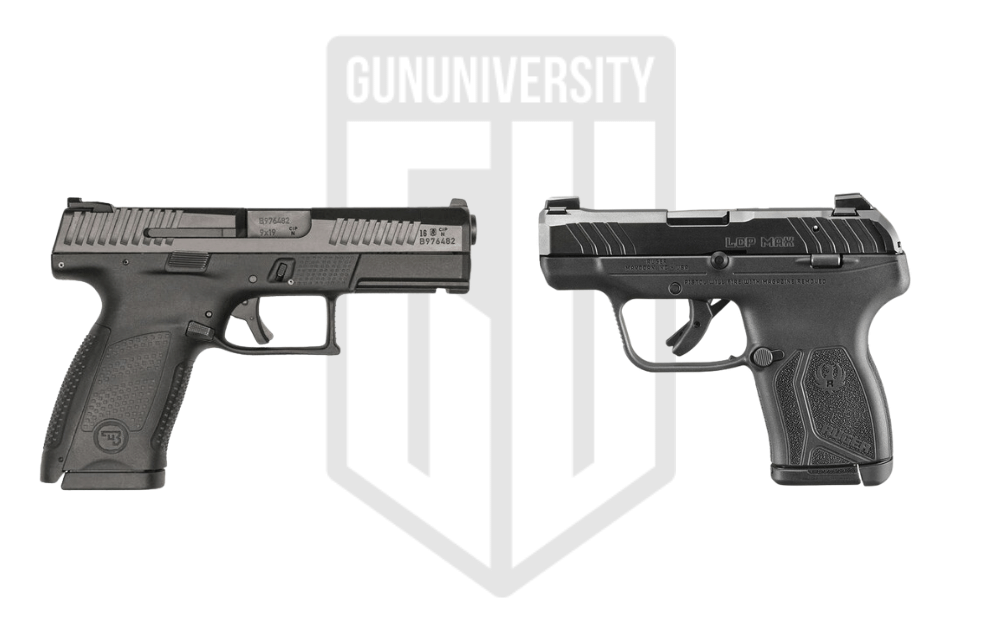
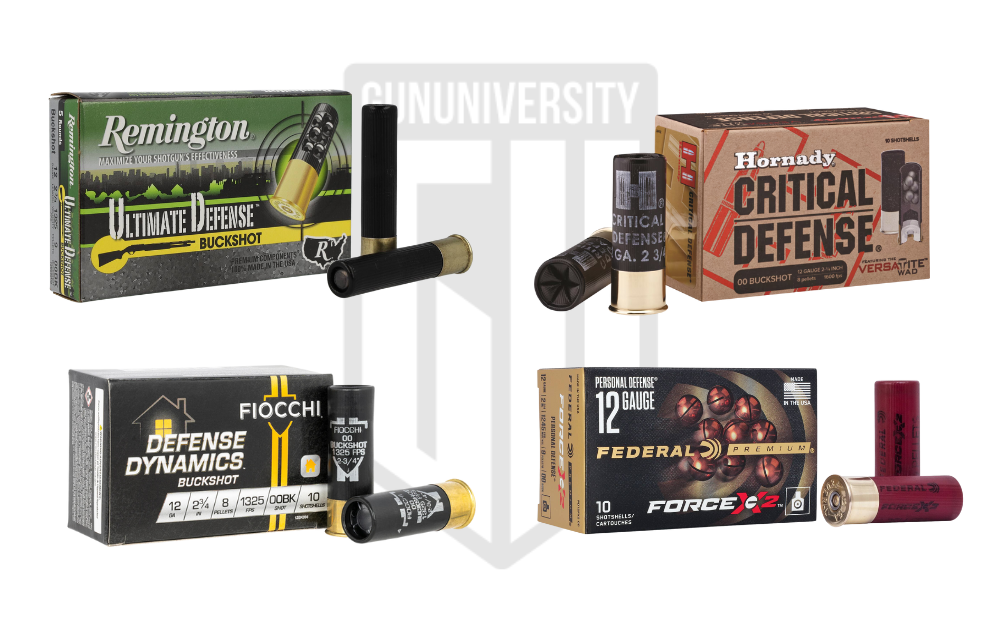


could you make a similar list for which chokes pattern best for a 20ga i have a code black goose and i love it in my 12 gauge i just wonder how much different you would want a 20ga coke to be
I have a full set of Mojo chokes and I am very pleased with the performance. From the turkey choke to the green timber choke in my Baretta, they have performed as well or better than any choke I have had in the past.